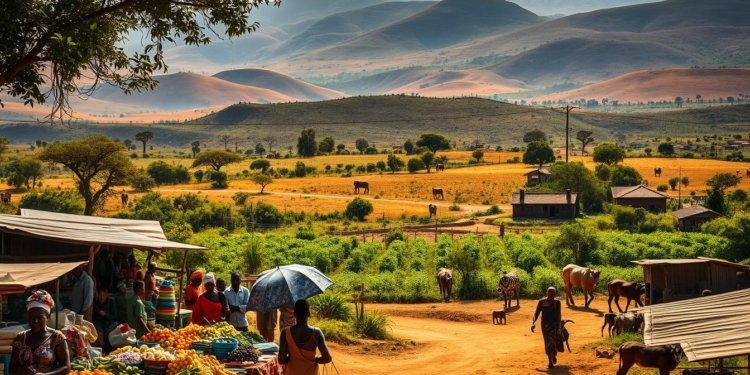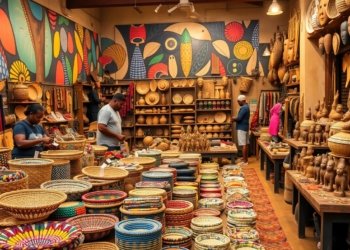Did you know that by 2050, Africa’s population could reach 2.5 billion, with 60% still facing poverty? Yet, hidden within this challenge lies immense potential. Rural areas across the continent hold untapped value, from agriculture to sustainable investments.
Agriculture drives growth here, employing over 60% of the workforce. Innovations in farming could boost food security and income. The World Bank notes that every $1 invested in protected areas yields $6 in return—proof that smart strategies pay off.
Infrastructure improvements and localized solutions can transform these regions. Success stories like iSimangaliso Wetland Park show what’s possible. The future hinges on balancing population growth with productivity gains.
Key Takeaways
- Africa’s rural regions offer vast potential despite current poverty rates.
- Agriculture remains a key driver for income and food security.
- Investments in nature-based projects deliver high returns.
- Infrastructure upgrades can strengthen community resilience.
- Localized solutions respect tribal rights while fostering growth.
The Untapped Potential of Rural Africa’s Economy
While many focus on urban centers, Africa’s countryside holds hidden wealth waiting to be unlocked. Over the past 20 years, employment in services surged from 30% to 39%, signaling a shift from traditional farming. Yet, productivity gaps persist—Africa’s GDP grew at 3.7% annually, lagging behind Asia’s 5-8% boom.

Geographic isolation limits market access, but success stories shine. South Africa expanded protected areas by 27,000 hectares, blending conservation with job creation. Meanwhile, KwaZulu-Natal’s ecotourism rebounded post-COVID, proving nature-based solutions work.
Barriers like low intra-Africa trade (just 17% of exports) stall progress. The AfCFTA could change this, mirroring East Asia’s export-driven model. Smart investment in roads and tech—like Ethiopia’s manufacturing push—can bridge gaps.
Youth engagement is critical. Influencers like Lucia Motloung show how digital tools empower communities. With 25 million jobs needed yearly, unlocking this region’s potential isn’t optional—it’s essential.
Key Economic Opportunities in Rural Africa
From wildlife conservation to high-tech farming, rural regions are rewriting their futures. These areas blend tradition with modern solutions to create jobs and boost incomes. Here’s how.

Nature-Based Tourism: A Growing Engine for Jobs
The Rhino Bond project proves conservation pays. It grew rhino populations by 7.65% yearly while supporting 90+ micro-businesses. Communities now offer guided tours and safety gear rentals.
Ecotourism rebounds fast. South Africa’s iSimangaliso Wetland Park trained fishers to host visitors. Local lodges and trails need builders—creating steady work.
Agricultural Innovation for Food Security and Income
Precision farming replaces guesswork. Mobile apps track soil health, doubling yields in Ghana. Smallholders switch to high-value crops like avocados, lifting incomes.
Agro-processing hubs add value. Malawi’s AGCOM project links farmers to markets. Warehouses with solar dryers cut waste and raise profits.
Local Business Development and Infrastructure
Better roads unlock trade. Only 10% of African imports come from neighbors. Upgrades like Madagascar’s roads slash travel time by 50%, helping rice farmers reach buyers.
Youth lead the charge. Digital projects in Rwanda train women to market crafts online. Tribal partnerships in Limpopo secure land rights for sustainable ventures.
Challenges Hindering Growth in Rural Communities
Behind the promise of progress, rural communities face deep-rooted challenges. Systemic gaps and external shocks stall development, leaving millions struggling to thrive.
Poverty and Limited Access to Resources
Over 80% of people in some areas survive on less than $11 a day. Farm inputs cost 40% more here than the global average, slashing productivity.
COVID-19 worsened gaps. Tourism-dependent regions saw GDP growth drop by 35% in recent years. Roads remain scarce—South Sudan has only 10,000 km of paved routes.
Climate Vulnerabilities and Economic Shocks
Floods damaged 130,000 hectares of farmland in 2022 alone. Coastal zones like iSimangaliso face rising erosion, threatening jobs and food security.
Energy poverty limits agro-processing. Only 4% of arable land is cultivated in some countries, despite 70% being farm-ready. Solutions must address these levels of risk.
Conclusion: Building a Sustainable Future for Rural Africa
The path forward blends innovation with tradition. South Africa’s 27,000-hectare conservation expansion shows how nature-based investment creates jobs. The Rhino Bond project proves this model works—boosting wildlife while empowering communities.
Key steps include land reform and skills training. Agro-ecology can tackle productivity gaps and climate risks. Digital tools help youth lead change, from ecotourism to online markets.
Public-private partnerships can scale success. Trade corridors linking countries will unlock growth. By 2050, green development could turn challenges into progress for the whole region.
FAQ
What makes rural Africa an attractive place for economic growth?
Rural areas offer vast untapped resources, fertile land, and a growing workforce. With investment in agriculture, tourism, and infrastructure, these regions can drive job creation and reduce poverty.
How does agriculture contribute to food security and income in rural Africa?
Farming remains the backbone of many communities. Innovations like drought-resistant crops and better irrigation boost productivity, ensuring stable food supplies while increasing earnings for local farmers.
What role does nature-based tourism play in rural development?
Wildlife reserves, cultural heritage sites, and eco-tourism attract visitors, creating jobs in hospitality and conservation. This sector helps diversify income sources beyond traditional farming.
What challenges do rural communities face in achieving economic progress?
Limited infrastructure, climate risks, and financial barriers slow growth. Many areas lack roads, electricity, and access to markets, making it harder to sustain businesses and improve living standards.
How can investment in infrastructure support rural economies?
Better roads, energy access, and digital connectivity open doors for trade and innovation. Reliable infrastructure helps farmers reach markets, businesses expand, and new industries emerge.
Why is sustainability important for rural Africa’s future?
Balancing growth with environmental protection ensures long-term benefits. Practices like regenerative farming and renewable energy projects help communities thrive without depleting natural resources.









